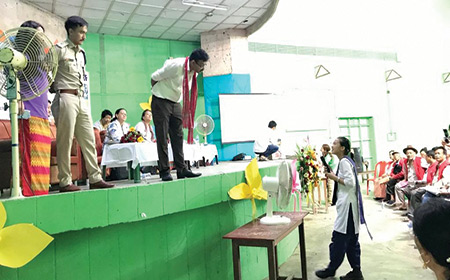DOIMUKH, Jul 19: Arunachal Pradesh State Commission for Women (APSCW) Chairperson Radhelu Chai Techi has said “it is time to consider granting land and property rights to the APST women of Arunachal.”
Delivering the keynote address on ‘Gender and patriarchal society’ during a legal awareness programme organised here in Papum Pare district on Friday by the APSCW in collaboration with the Arunachal Pradesh Women’s Welfare Society (APWWS), Chai said, “The women in the state have no property and land rights, whereas women under the Hindu law can enjoy these rights.”
She also called for implementation of 33 percent job reservation for women in the state, saying it would be “a big step forward for gender parity.”
Chai also informed that the highest cases received by the APSCW relate to domestic violence, followed by cases of polygamy, family maintenance, and rape.
She further said that gaon burahs (GB) should not exceed their powers while deciding any case, “as was seen in a particular case received by the APSCW, wherein an ex parte decision was passed by the GBs.”
She said the APSCW has already spoken to the chief secretary to take action against such erring GBs, as most women the villages do not get justice at the village level.
“Any customary practice which is inconsistent with the constitutional rights under Articles 14, 15 and 21 cannot be upheld by law,” Chai said.
Attended by Class 11 and 12 students, GBs, and representatives of women self-help groups, the programme featured resource persons sharing information on drug abuse, mental health, women’s rights, livelihood options, and sexual harassment.
APSLSA Member Secretary Budi Habung said customary practices and customary laws, in most cases, are “gender biased, and the women are denied ownership and inheritance.”
“Women control production and family but the men control the resource and ownership of the property with selling power,” he said.
Habung informed that Nagaland and Mizoram have almost the same practices, “but recently Mizoram passed a new state legislation under which women can inherit specified properties.”
He also said that with the separation of the judiciary in the state, almost all general laws are applicable. There are courts in 19 districts, with 23 judges, and cases are tried in the judicial courts as per civil and criminal procedures, he said.
Papum Pare SP Pranav Tayal during an interactive session with the students and other participants said students are being targeted by drug peddlers, and added that the police are trying their best to contain the supply and abuse of drugs.
“Drug abuse can only be contained if there is combined and consistent effort by everyone in the society,” Tayal said.
The SP called on the women’s organizations to play a proactive role in containing drug abuse.
SDPO Kamdam Sikom informed that “Papum Pare has a huge problem because of large-scale cultivation of marijuana in Mengio and Sagalee.”
The rural development department’s ICE nodal officer, Tamar Baki, spoke on livelihood opportunities and said “there are avenues for self-employment which are being promoted by the government.”
TRIHMS psychiatrist Dr Aroti Namchoom Ete spoke on mental health and wellbeing. Underscoring the importance of getting treated for any mental health ailment, she added that “substance and alcohol abuse worsen mental health issues.”
Former APSCW chairperson Gumri Ringu spoke on sexual harassment at workplace. She said that, unlike in the past, now there are legislations in place to check sexual harassment.
“However,” she said, “despite all the necessary legislations, women continue to suffer from sexual harassment at workplace,” and advised women to make use of the laws that are in place.
APWWS president Dipti Bengia Tadar said drug abuse “is eroding the society and urgent steps must be taken to control the damage it is inflicting on the Arunachalee society.”
APWWS secretary-general Kani Nada Maling said it was necessary to organize the event in Doimukh “because the town has become one of the drug hubs of the capital region.”



